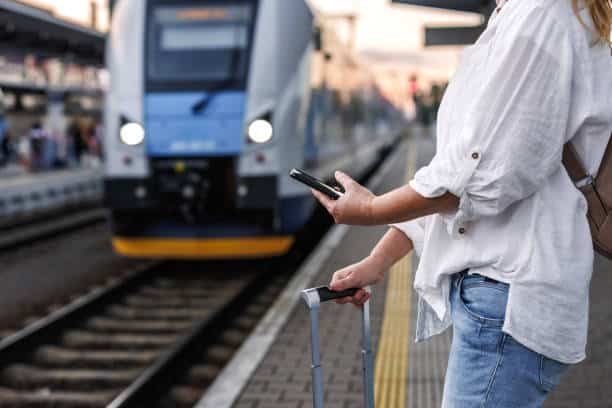In recent years, the travel industry has undergone a significant transformation, driven by advancements in technology and changing consumer preferences. One of the most notable shifts has been the rise of mobile ticketing. As smartphones become ubiquitous, travelers are increasingly opting for digital solutions that simplify the booking process and enhance their travel experiences. This article explores how mobile ticketing is revolutionizing travel, the benefits it offers, and what the future holds for this innovative approach.
Key Takeaway
The future of travel lies in mobile ticketing, which offers unparalleled convenience, security, and efficiency. As technology advances, travelers can anticipate an even more personalized and seamless booking experience, marking a significant shift in the travel landscape. Adopting mobile ticketing solutions not only benefits consumers but also provides businesses with valuable insights and cost-saving opportunities, solidifying its place as a cornerstone of modern travel.
The Rise of Mobile Ticketing
The Evolution of Ticketing
Historically, ticketing was a cumbersome process involving physical tickets, paper itineraries, and long waits in line. As technology advanced, the industry saw the introduction of electronic tickets (e-tickets), which allowed travelers to receive their tickets via email. This shift marked the beginning of a digital revolution, paving the way for mobile ticketing.
Mobile Ticketing Defined
Mobile ticketing refers to the process of purchasing and storing tickets on mobile devices, such as smartphones or tablets. This technology allows travelers to access their tickets anytime and anywhere, eliminating the need for physical copies. Mobile ticketing can be applied to various sectors, including airlines, train services, concert venues, and amusement parks.
How Mobile Ticketing Works
Booking Process
The mobile ticketing process is designed to be user-friendly. Travelers can browse available options on mobile apps or websites, select their desired tickets, and complete the purchase using secure payment methods. Once the transaction is complete, tickets are delivered electronically, often in the form of QR codes or digital passes.
Accessing Tickets
Travelers can easily access their tickets via mobile wallets or dedicated ticketing apps. QR codes can be scanned at entry points, streamlining the check-in process. This method not only saves time but also minimizes contact, which has become increasingly important in the wake of the COVID-19 pandemic.
Benefits of Mobile Ticketing
Convenience
One of the most significant advantages of mobile ticketing is convenience. Travelers no longer need to worry about losing physical tickets or printing them out. All ticket information is securely stored on their devices, allowing for easy access at any time.
Instant Updates
Mobile ticketing systems can send real-time updates regarding changes to flight times, gate information, or event details. This instant communication ensures that travelers are informed and can adjust their plans accordingly.
Enhanced Security
Digital tickets are more secure than traditional paper tickets. Mobile ticketing platforms often use encryption and authentication measures to protect users’ information. Additionally, the risk of losing tickets is virtually eliminated, as they are stored on personal devices.
Environmentally Friendly
As the world increasingly prioritizes sustainability, mobile ticketing presents an eco-friendly alternative. By reducing the need for printed tickets, the travel industry can significantly decrease paper waste and contribute to environmental conservation efforts.
Cost-Effectiveness
Mobile ticketing can lower operational costs for businesses. By eliminating the need for physical ticket production and distribution, companies can save on materials and shipping expenses. These savings can, in turn, be passed on to consumers in the form of lower ticket prices.
Improved Customer Experience
The seamless nature of mobile ticketing enhances the overall customer experience. With easy access to tickets, instant updates, and the ability to store multiple tickets in one place, travelers enjoy a more streamlined and stress-free journey.
The Impact of Mobile Ticketing on Various Sectors
Airlines
In the airline industry, mobile ticketing has transformed the way passengers check in for flights. Many airlines now offer mobile boarding passes that can be scanned directly at the gate. This not only speeds up the boarding process but also reduces congestion at airport kiosks.
Public Transportation

Cities around the world are adopting mobile ticketing solutions for public transportation. Commuters can purchase tickets for buses, trains, and trams using their smartphones, allowing for a more efficient and hassle-free travel experience. Features such as real-time tracking and alerts further enhance usability.
Events and Entertainment
Mobile ticketing has also made waves in the events sector. Concerts, sporting events, and festivals increasingly utilize mobile tickets, allowing attendees to bypass long lines and access venues with ease. Additionally, event organizers can track attendance and gather valuable data for future planning.
Amusement Parks
Amusement parks have embraced mobile ticketing to improve guest experiences. Visitors can purchase tickets in advance, skip the lines, and even use mobile apps to navigate the park. Features such as ride wait times and food ordering further enhance the convenience of the mobile experience.
The Future of Mobile Ticketing
Integration with Other Technologies
As mobile ticketing continues to evolve, we can expect greater integration with other technologies. Features such as augmented reality (AR) and artificial intelligence (AI) may become commonplace, offering personalized experiences and interactive features for travelers.
Expansion of Mobile Wallets
Mobile wallets like Apple Pay and Google Wallet are gaining popularity, and their integration with ticketing systems will likely become more prevalent. This will streamline the purchasing process, making it easier for consumers to manage their travel plans.
Enhanced Data Utilization
The data collected through mobile ticketing platforms can be leveraged to create personalized experiences for travelers. By analyzing customer preferences and behaviors, companies can offer tailored recommendations, discounts, and promotions.
Increased Focus on Security
As digital transactions become the norm, security will be a top priority for mobile ticketing platforms. Companies will need to invest in robust security measures to protect user data and maintain trust.
Regulatory Considerations
As mobile ticketing grows, so too will the need for regulatory frameworks to govern its use. Industry stakeholders must work together to establish guidelines that protect consumers while promoting innovation.
Seamless Access: The Benefits of Mobile Ticketing for Events and Travel
In today’s fast-paced digital world, the demand for convenience and efficiency is ever-growing. As a result, mobile ticketing has emerged as a game-changer for both event organizers and travelers. From concerts and sporting events to flights and train journeys, the traditional paper ticket is increasingly being replaced by mobile tickets that can be stored directly on smartphones. Mobile ticketing is transforming how tickets are purchased, stored, and presented, offering a smoother, faster, and more secure experience for consumers and businesses alike.
Mobile ticketing refers to the use of smartphones and mobile apps to purchase, store, and present tickets for various services. This technology has already gained significant traction in industries like travel, entertainment, and transportation, offering numerous benefits to both users and service providers. In this article, we will explore how mobile ticketing works, its advantages, and why it is quickly becoming the preferred method of ticket management for events and travel.
Mobile ticketing allows users to purchase tickets for events, travel, or other services using their smartphones or tablets. Unlike traditional paper tickets or even printed e-tickets, mobile tickets are stored digitally in a mobile app, such as Apple Wallet, Google Pay, or a specific event or travel provider’s app. These tickets can then be presented on the user’s smartphone when entering an event or boarding transportation. Typically, a QR code, barcode, or NFC (Near Field Communication) technology is used for scanning and verification.
Mobile ticketing has gained popularity because it offers a streamlined, paperless experience. No longer do travelers need to print out tickets or carry physical copies of event passes. Everything can be stored and accessed on their smartphones, making it easier and more efficient for both consumers and service providers.
Key Benefits of Mobile Ticketing
Convenience and Accessibility
One of the most significant advantages of mobile ticketing is convenience. Traditional ticketing often involves long queues at box offices or ticket counters, as well as potential delays due to paper-based processes. Mobile ticketing, on the other hand, eliminates the need to wait in line or worry about losing physical tickets. Everything is stored securely on the user’s smartphone, which is always within reach.
With mobile ticketing, travelers and event-goers can quickly purchase and store their tickets, receive real-time updates, and present them directly from their phones. This makes it easier for users to manage their tickets, especially when they are attending multiple events or traveling to different locations.
Paperless and Eco-Friendly
Mobile ticketing contributes to sustainability by reducing the need for printed tickets. Paper-based tickets generate waste, consume resources, and contribute to environmental pollution. By adopting digital tickets, consumers can play a part in helping reduce paper waste, making mobile ticketing a more environmentally-friendly option.
In addition, with mobile ticketing, there is no need for bulky paper or plastic tickets to be physically handled or mailed. Users can simply store their tickets on their smartphones and retrieve them when needed, which leads to less clutter and waste.
Enhanced Security
Traditional tickets can be lost, stolen, or forged, leaving both event organizers and travelers vulnerable. Mobile ticketing offers enhanced security because digital tickets often use encrypted barcodes or QR codes, making them harder to counterfeit. Additionally, mobile ticketing apps may require authentication methods like facial recognition, passwords, or biometrics to ensure that only the authorized individual can access the ticket.
Mobile ticketing platforms also allow users to quickly revoke or replace lost or stolen tickets. This added layer of security provides peace of mind for users who no longer need to worry about misplaced paper tickets.
Instant and Real-Time Updates
Mobile ticketing allows for real-time updates on ticket status, which is particularly useful for both event organizers and travelers. For example, in the travel industry, a flight delay or change in boarding gate can be immediately communicated to passengers through their mobile ticketing app. Similarly, for event organizers, last-minute changes or schedule updates can be pushed directly to ticket holders.
This ensures that users are always informed and can make adjustments as needed without relying on printed notifications or last-minute announcements.
Faster Entry and Boarding

One of the most obvious benefits of mobile ticketing is the speed at which users can gain entry to an event or board transportation. With a QR code or barcode stored on their smartphone, users can quickly scan their mobile ticket for instant verification, which reduces wait times and congestion at entry points. This is particularly important for high-traffic events or busy travel seasons, where delays are common.
In the context of air travel, mobile boarding passes enable passengers to board flights more quickly and easily. For train or bus travel, passengers can simply scan their tickets at the gate, bypassing long queues for ticket validation. Overall, mobile ticketing enhances the efficiency and flow of travel and event access.
Cost-Efficiency
For event organizers and travel companies, mobile ticketing can lead to cost savings. Physical ticket printing, distribution, and handling can be expensive, particularly when dealing with large volumes of customers. By switching to digital tickets, service providers can reduce costs associated with printing, postage, and ticket fraud prevention.
Additionally, mobile ticketing eliminates the need for intermediary ticket vendors, enabling businesses to sell directly to consumers via their own mobile platforms. This streamlines the sales process and reduces the overhead costs of using third-party ticket distribution services.
Improved User Experience
Mobile ticketing enhances the overall customer experience by providing a seamless and efficient way to purchase and use tickets. With digital tickets, users don’t have to worry about losing or damaging physical tickets, and they can easily access their tickets on the go. The use of mobile apps allows for a smoother interaction with ticketing systems, making it easier for consumers to book, manage, and use tickets.
Moreover, mobile ticketing integrates well with other services like digital wallets, loyalty programs, and even event-specific apps, which further enhances the convenience and experience of attending an event or traveling.
Applications of Mobile Ticketing in Events and Travel
Event Ticketing
Mobile ticketing is transforming the event industry, from concerts and sports games to theater performances and festivals. Event organizers are increasingly adopting mobile ticketing solutions to streamline the entry process, reduce fraud, and improve the fan experience. Attendees can store their tickets on their smartphones and present them at the gate, reducing the likelihood of human error and speeding up the check-in process.
Mobile ticketing also provides event-goers with the flexibility to purchase tickets on-demand, transfer them to others, or even upgrade their tickets through in-app features. Real-time updates, such as schedule changes, cancellations, or alerts, are also easier to communicate via mobile ticketing.
Travel Ticketing
Mobile ticketing has also revolutionized the travel industry. Airlines, railways, buses, and even ferries have embraced mobile ticketing as a convenient and secure way to manage reservations. For example, airlines offer digital boarding passes that allow passengers to check in online, receive updates about their flights, and board with just a scan of their phone.
Train and bus companies have also integrated mobile ticketing, allowing passengers to purchase and store tickets digitally and simply scan them at the gates. This integration improves the overall travel experience by offering real-time updates and reducing the need for paper tickets.
Public Transportation
Mobile ticketing has simplified public transportation systems in major cities. Passengers can buy and use digital tickets on buses, subways, and trams, eliminating the need for paper tickets or physical transit cards. Mobile ticketing for public transportation has been particularly useful in reducing wait times and streamlining payment systems.
Exploring the Advantages of Mobile Ticketing in the Digital Age

In the digital age, technology is reshaping the way we engage with everyday activities, and ticketing is no exception. Mobile ticketing, where tickets are purchased, stored, and presented via smartphones, has become an essential part of the modern experience, particularly in the travel, entertainment, and transportation industries. It offers a faster, more secure, and eco-friendly alternative to traditional paper tickets, transforming how both consumers and businesses handle reservations and access.
Mobile ticketing allows customers to buy tickets digitally for events, travel, and services, using mobile apps or digital wallets such as Apple Wallet and Google Pay. Tickets are typically stored as QR codes, barcodes, or virtual passes, which can be scanned for entry. This system eliminates the need for physical tickets, streamlining the entire process for users.
Key Advantages of Mobile Ticketing
- Convenience and Speed
The primary advantage of mobile ticketing is convenience. It enables customers to buy tickets and store them directly on their phones, eliminating the need to visit box offices or print out tickets. Users can easily access their tickets anytime, anywhere, and quickly present them for entry to events or travel, saving time and reducing stress. - Environmental Benefits
Mobile ticketing reduces paper waste, contributing to environmental sustainability. Traditional paper tickets require printing, packaging, and mailing, which consume resources and generate waste. By adopting digital ticketing, industries reduce their carbon footprint and help protect the environment. - Enhanced Security
Mobile tickets are more secure than paper tickets. They are encrypted and often include unique identifiers like QR codes or barcodes, which can only be used once. Some mobile ticketing systems also feature biometric authentication, ensuring that only the authorized individual can use the ticket. In case of loss or theft, mobile tickets can be easily revoked or replaced. - Real-Time Updates
Mobile ticketing provides real-time notifications and updates. Whether it’s a flight delay, event schedule change, or a transport update, users receive instant alerts on their smartphones, helping them stay informed and make adjustments quickly. This feature improves customer satisfaction and ensures a smoother experience. - Faster Entry and Streamlined Access
Mobile ticketing speeds up the entry process for events and travel. Rather than waiting in line or dealing with physical tickets, users can scan their mobile tickets directly from their phones. This is especially useful for high-traffic events or busy travel seasons, where quick and efficient access is crucial. - Cost-Effective for Businesses
Mobile ticketing reduces operational costs for businesses by eliminating the need for paper tickets, printing, and mailing. It also enables companies to sell tickets directly to consumers through mobile apps, streamlining the sales process and reducing reliance on third-party vendors.
Applications of Mobile Ticketing
Mobile ticketing is widely used across several industries. In the travel sector, airlines, trains, buses, and even ferries have adopted mobile ticketing for boarding passes and reservations. In events, concerts, sports games, and festivals have embraced digital tickets to enhance the customer experience, allowing attendees to store tickets in digital wallets and present them easily at venues.
Mobile ticketing is revolutionizing how we access travel, events, and services. With its numerous benefits, including convenience, security, environmental sustainability, and cost savings, mobile ticketing is becoming the preferred choice for consumers and businesses. As technology continues to evolve, mobile ticketing will only become more widespread, offering an even more seamless and efficient experience for users around the world.
Also Read: The Evolution Of Booking Platform: How Technology Is Shaping Travel And Reservations
Conclusion
Mobile ticketing is transforming the travel industry, offering unprecedented convenience, security, and efficiency. As technology continues to evolve, travelers can expect even more innovative features and enhancements. The shift towards mobile ticketing is not just a trend; it is a fundamental change in how we experience travel. Companies that embrace this revolution will not only improve customer satisfaction but also position themselves as leaders in a competitive market.
FAQs
What is mobile ticketing?
Mobile ticketing allows travelers to purchase and store tickets on their mobile devices, eliminating the need for physical tickets.
How do I access my mobile ticket?
Mobile tickets can be accessed through mobile apps or digital wallets, often displayed as QR codes or digital passes.
Is mobile ticketing secure?
Yes, mobile ticketing platforms use encryption and authentication measures to protect user data and prevent unauthorized access.
Can I transfer my mobile ticket to someone else?
Transfer policies vary by provider. Some allow ticket transfers, while others do not. Always check the specific terms and conditions.
What happens if my phone dies before I use my mobile ticket?
Many providers allow you to access your tickets through an online account or email. It’s advisable to have a backup method, such as a screenshot.
Are there additional fees for mobile ticketing?
Some providers may charge a small fee for mobile ticket purchases, but many offer competitive pricing without extra charges.
Will mobile ticketing replace traditional tickets completely?
While mobile ticketing is becoming increasingly popular, traditional tickets may still be available for those who prefer them. However, the trend suggests a shift towards digital solutions.




